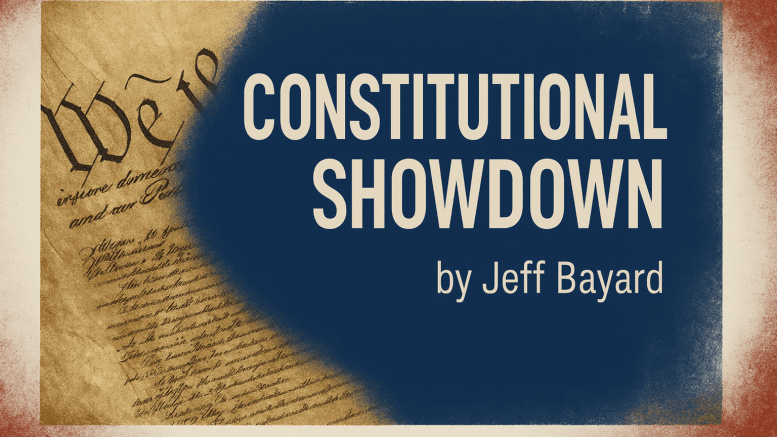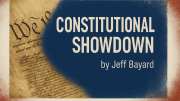Morning Brief: Life & Family
Professional Conduct or Protected Speech: What Chiles v. Salazar Means for Christian Counselors
October 9, 2025 | By Jeff Bayard
The Virginia Christian Alliance begins our Morning Brief: Life & Family series, by Jeff Bayard, examining cultural issues through a Christian worldview and constitutional originalism. Today we address how modern courts threaten the religious liberty of Christian professionals while equipping believers to defend biblical truth through faithful citizenship and prayer.
A Worldview Clash at the Supreme Court
On Tuesday, October 7, 2025, the Supreme Court of the United States heard oral arguments in a case that perfectly illustrates the collision between biblical truth and secular ideology. Chiles v. Salazar forces the nine justices to answer a deceptively simple question:
Can the government tell Christian counselors what they’re allowed to say?
Consider the predicament facing Kaley Chiles, a licensed Christian counselor in Colorado.
- State law permits her to tell struggling teenagers that same-sex attraction is normal and healthy.
- She can encourage minors to embrace transgender identity.
- She can affirm confusion as clarity.
Yet Colorado forbids her from doing one thing: offering biblical counsel that aligns sexual identity with God’s design.
As Dr. Albert Mohler explained in Wednesday’s edition of The Briefing,
“This isn’t just a clash of constitutional views or legal arguments—Christians understand it is also often a clash of worldviews.”
The stakes couldn’t be higher. This case will determine whether Christians can function as Christians in licensed professions, or whether the state can compel us to speak lies.
Watch: Dr. Albert Mohler’s Analysis of Chiles v. Salazar
For daily Christian worldview analysis of current events, subscribe to The Briefing with Dr. Albert Mohler—an essential resource for believers navigating our cultural moment.
What Colorado’s “Conversion Therapy” Ban Actually Does
Colorado, like approximately half of U.S. states, has enacted legislation banning so-called “conversion therapy” for minors. The state claims this protects vulnerable young people from harmful practices. But the law’s actual effect reveals something far more troubling.
Under Colorado’s statute, Kaley Chiles can tell a confused 15-year-old boy that he might actually be a girl. She can recommend social transition, hormone blockers, and eventual surgical intervention. The state calls this “affirming care” and mandates that licensed professionals support it.
But if that same counselor tells the same teenager, “God created you male for a purpose. Your confusion stems from a fallen world, not from being born in the wrong body. Let’s explore what Scripture says about your identity in Christ”—Colorado calls this harmful conversion therapy and threatens her license.
The law doesn’t merely regulate abusive practices. It regulates ideas. Specifically, it targets biblical ideas.
Dr. Mohler makes a crucial distinction that Christians must understand: “Not everything that is called conversion therapy is something that biblical Christians would support.” Some practitioners have used manipulative techniques, including exposing struggling young men to heterosexual pornography in misguided attempts to “reprogram” attraction. Christians should oppose such methods as both unbiblical and ineffective.
Colorado’s law, however, doesn’t merely ban questionable therapeutic techniques. It bans truth-telling. It prohibits a Christian counselor from saying what Scripture clearly teaches: “Male and female he created them” (Genesis 1:27).
The Biblical Foundation: God Defines Reality, Not the State
Before we examine the constitutional issues, we must establish the theological foundation. Christians don’t oppose Colorado’s law merely because it violates the First Amendment—though it certainly does. We oppose it because it commands us to deny what God has revealed.
Genesis 1:27 declares: “So God created man in his own image, in the image of God he created him; male and female he created them.” This isn’t a suggestion or cultural preference. It’s the fundamental structure of human existence. God created two sexes—male and female—and assigned them complementary roles in His design.
When Colorado tells Kaley Chiles she must affirm a teenager’s transgender identity, the state isn’t simply regulating professional conduct. Rather, it’s demanding that a Christian participate in what Romans 1:25 describes as exchanging “the truth about God for a lie.” The state commands Christians to call God’s design a mistake and human confusion the truth.
Proverbs 14:12 warns: “There is a way that seems right to a man, but its end is the way to death.” Affirming same-sex attraction or transgender identity may seem compassionate to a secular culture. Christians, however, understand that true compassion speaks truth, even when that truth is difficult. Telling a struggling teenager that rebellion against God’s design leads to flourishing isn’t love—it’s cruel deception.
Matthew 18:6 carries a sobering warning: “Whoever causes one of these little ones who believe in me to sin, it would be better for him to have a great millstone fastened around his neck and to be drowned in the depth of the sea.” Christian counselors face an impossible choice under Colorado’s law: violate Scripture by affirming sin, or violate state law by speaking truth. For believers, there is no choice. We must obey God rather than men (Acts 5:29).
Beyond the legal arguments, the spiritual dimension of this case demands our attention. As Ephesians 6:12 reminds us, “We do not wrestle against flesh and blood, but against the rulers, against the authorities, against the cosmic powers over this present darkness.” Therefore, Colorado’s law represents more than misguided policy—it’s a manifestation of spiritual warfare aimed at silencing biblical truth about human identity and sexuality.
The Constitutional Framework: Free Speech and Religious Liberty
Having established the biblical foundation, we now turn to the constitutional issues. The Framers of the Constitution understood that government power must be limited, particularly when it comes to regulating speech and religious exercise. The First Amendment begins with two fundamental protections: “Congress shall make no law respecting an establishment of religion, or prohibiting the free exercise thereof; or abridging the freedom of speech.”
During oral arguments, Justice Samuel Alito cut to the heart of the matter: This is “a straightforward free speech issue.” Colorado has created a content-based restriction on speech—the most suspect category under First Amendment jurisprudence. Counselors can say one thing (affirm same-sex attraction) but not another (encourage alignment with biological sex), even though both involve the same subject matter and the same minor client.
Justice Elena Kagan, no conservative, pressed Colorado’s attorney on whether the state can “choose a view on an issue that it declares to be state orthodoxy.” Her question reveals the danger: If states can mandate which viewpoints professionals must express, free speech becomes meaningless. The government becomes the arbiter of acceptable thought.
The Framers designed the First Amendment to prevent exactly this scenario. They understood from bitter experience under British rule that governments inevitably abuse the power to regulate speech. When authorities can silence dissenting views by declaring them “harmful,” no speech remains safe.
Colorado’s attorney argued that counseling constitutes “medical treatment” rather than speech, and therefore falls within the state’s regulatory authority.
As Dr. Mohler noted, however,
“If you can define talk as medical treatment, then you could… shut down an entire avenue of speech.”
This precedent threatens not only Christian counselors but pastors, teachers, parents, and anyone who speaks biblical truth about sexuality.
The original intent of the First Amendment is clear: Government cannot compel speech, especially speech that violates religious conviction. James Madison, the amendment’s primary author, wrote in Memorial and Remonstrance Against Religious Assessments that religious liberty includes the right to practice faith according to conscience, free from government coercion. Colorado’s law violates this foundational principle.
When Biblical Truth and Constitutional Freedom Align
Here’s where the beauty of America’s constitutional design becomes evident: The Framers’ understanding of natural rights and limited government reflects, even if imperfectly, biblical principles about human dignity and freedom.
Consider the parallel: God created humans with free will. He doesn’t force anyone to follow Him—He invites and commands, but the choice remains ours. Similarly, the Constitution recognizes that government shouldn’t compel belief or coerce speech. Both frameworks respect human agency while maintaining objective truth.
The First Amendment protects Kaley Chiles’s right to speak biblical truth not because the government grants that right, but because God does. Government’s role is simply to recognize and protect what God has already given. Consequently, when Colorado violates Chiles’s free speech, it also violates God’s design for limited government authority (Romans 13:1-7).
This is why Christians must defend constitutional rights even as we ground our ultimate authority in Scripture. The Constitution, rightly interpreted according to original intent, provides the legal framework for believers to live out their faith publicly. When courts twist constitutional meaning to suppress biblical truth, they violate both the Framers’ design and God’s moral order.
The Opposition’s Argument (And Why It Fails)
Colorado’s strongest argument deserves serious consideration: The state has legitimate authority to regulate professional conduct and protect minors from harm. Licensed professionals—doctors, lawyers, counselors—must meet certain standards. Can’t the state ensure that counselors use evidence-based practices?
On the surface, this sounds reasonable. Upon closer examination, however, it collapses under scrutiny.
First, Colorado’s law doesn’t regulate harmful actions—it regulates ideas. Christian counselors like Kaley Chiles don’t use coercive techniques or manipulative methods. They offer talk therapy grounded in Scripture. If a minor disagrees or feels uncomfortable, they can simply leave. No one is forcing biblical counseling on unwilling participants.
Second, who decides what constitutes “evidence-based practice” in matters of identity and sexuality? Colorado’s law presumes that affirming same-sex attraction and transgender identity represents settled science. The evidence, however, is far from settled. Rapid increases in gender dysphoria among teenage girls, high rates of regret among detransitioners, and the complete absence of long-term studies on pediatric gender transition all suggest caution, not certainty.
Third, even if Colorado could demonstrate harm from certain counseling approaches, the remedy cannot be viewpoint discrimination. The state could regulate specific techniques while protecting speech. Instead, Colorado chose to ban an entire viewpoint—the biblical understanding of sexuality—while mandating the opposite viewpoint. This isn’t about protecting minors. It’s about enforcing ideological conformity.
Dr. Mohler identifies the deeper issue:
“Behind this legislation is the clear assertion there is no problem [with same-sex attraction], that the problem is with those who have a problem with same-sex attraction.”
Colorado’s law doesn’t merely regulate therapy—it declares biblical Christianity itself to be harmful.
What’s Really at Stake: The Future of Christian Professionals
If the Supreme Court rules against Kaley Chiles, the implications extend far beyond Colorado counselors. Christian doctors, teachers, lawyers, nurses, social workers, and countless other licensed professionals will face the same impossible choice: Abandon biblical convictions or abandon your profession.
Dr. Mohler notes that professional organizations like the American Medical Association and American Bar Association have already been captured by LGBTQ ideology. These groups, which often control state licensing boards, aggressively promote views incompatible with biblical Christianity. A Supreme Court ruling against Chiles would embolden these organizations to purge Christians from the professions entirely.
Consider the trajectory: Today, counselors can’t speak biblical truth about sexuality. Tomorrow, doctors who refuse to perform gender transitions lose their licenses. Next year, teachers who won’t use preferred pronouns face termination. Within a decade, Christian professionals might exist only in explicitly religious institutions—if those remain protected at all.
This isn’t speculation. It’s already happening in parts of Europe and Canada, where Christians face prosecution for expressing biblical views on sexuality. Dr. Mohler references cases in Scandinavia where pastors have been arrested for preaching what Scripture clearly teaches. Great Britain now arrests citizens for social media posts that critique transgender ideology.
As a result, the United States stands at a crossroads. Either we reaffirm the First Amendment’s protection of religious speech, or we follow Europe into state-enforced ideological conformity. Chiles v. Salazar will determine which path we take.
A Note of Hope: Even Liberal Justices Questioned Colorado
Despite the grave stakes, oral arguments revealed encouraging signs. Justice Kagan’s skepticism about state orthodoxy suggests that even the Court’s liberal wing recognizes the free speech danger. Chief Justice Roberts and the conservative justices pressed Colorado’s attorney hard, indicating they see through the state’s attempt to disguise viewpoint discrimination as professional regulation.
Early reports suggest a likely victory for Kaley Chiles. Christians, however, must remember that oral arguments don’t guarantee outcomes. The Court won’t issue a ruling for months. In the meantime, we have responsibilities.
What Christians Must Do Now
1. Pray for the Supreme Court Justices
First Timothy 2:1-2 commands us: “I urge that supplications, prayers, intercessions, and thanksgivings be made for all people, for kings and all who are in high positions, that we may lead a peaceful and quiet life, godly and dignified in every way.”
Pray specifically that:
- The justices would have wisdom to see the free speech issue clearly
- They would resist political pressure and rule according to constitutional text
- They would understand the religious liberty implications
- God would use this case to protect Christian professionals nationwide
2. Support Christian Legal Organizations
Alliance Defending Freedom represents Kaley Chiles in this case. Consider supporting ADF and similar organizations like First Liberty Institute and Becket Fund. These groups defend religious freedom in courtrooms across America. Your financial support enables them to take cases like Chiles v. Salazar all the way to the Supreme Court.
3. Educate Your Church and Family
Many Christians remain unaware of threats to religious liberty. Share this article. Discuss Chiles v. Salazar in small groups. Help fellow believers understand that professional licensing boards increasingly function as ideological enforcers. Prepare the next generation for the reality that following Christ may cost them career opportunities.
4. Encourage Christian Professionals in Your Congregation
If your church includes counselors, doctors, teachers, or other licensed professionals, pray for them specifically. They face tremendous pressure to compromise biblical convictions. Let them know your church supports them standing firm, even if it costs them professionally.
5. Contact Your State Legislators
Does your state have conversion therapy ban legislation? Contact your representatives. Urge them to repeal or amend these laws to protect religious speech. Even if your state doesn’t currently have such legislation, preemptive action prevents future threats.
Find your legislators at: https://www.congress.gov/state-legislature-websites
6. Prepare for the Long Battle
Chiles v. Salazar represents one battle in a much longer war. Win or lose, the cultural assault on biblical sexuality won’t stop. Christians must prepare for sustained engagement—legally, politically, culturally, and spiritually. This requires institutional involvement: Christian schools, ministries, media, and professional networks that can operate independently of hostile secular organizations.
Conclusion: Standing Firm on Truth and Freedom
Kaley Chiles faces professional ruin for the “crime” of offering biblical counsel to struggling teenagers. Her case reveals the precarious position of Christians in contemporary America. We can no longer assume that religious liberty protections will endure without vigorous defense.
Even as we fight legal battles, however, we must remember that our ultimate confidence rests not in Supreme Court rulings but in the sovereign God who ordained government for His purposes (Romans 13:1). Whether the Court rules for or against Kaley Chiles, God remains on His throne. His Word remains true. And His people remain called to speak truth, regardless of consequence.
The Apostle Paul wrote from prison: “Remember Jesus Christ, risen from the dead, the offspring of David, as preached in my gospel, for which I am suffering, bound with chains as a criminal. But the word of God is not bound!” (2 Timothy 2:8-9).
Colorado can threaten licenses. Courts can rule against religious freedom. Professional organizations can demand ideological conformity. Yet they cannot bind the Word of God. They cannot silence truth. And they cannot separate believers from the love of Christ (Romans 8:38-39).
We stand at a critical moment. Chiles v. Salazar will shape religious liberty for generations. Christians must engage this battle with wisdom, courage, and hope—wisdom to understand the legal issues, courage to speak truth even at great cost, and hope grounded in God’s ultimate victory.
The path forward is clear: Pray fervently. Support boldly. Speak truthfully. Stand firmly. And trust completely in the God who works all things according to His purposes.
“And let us not grow weary of doing good, for in due season we will reap, if we do not give up.” (Galatians 6:9)
Resources
Primary Sources:
- Chiles v. Salazar – SCOTUSblog Case Page
- Supreme Court Oral Argument Transcript
- Colorado’s Conversion Therapy Ban – Full Text
Constitutional Resources:
Christian Worldview Analysis:
- The Briefing with Dr. Albert Mohler – Daily analysis of news from a Christian worldview
- Alliance Defending Freedom – Legal defense for religious liberty
Related VCA Articles:
Scripture for Further Study:
- Genesis 1:27 (Creation of male and female)
- Romans 1:18-32 (God’s design and human rebellion)
- Matthew 18:1-6 (Protecting little ones)
- Acts 5:29 (Obeying God rather than men)
- Ephesians 6:10-18 (Spiritual warfare)
The views and opinions expressed in this article are those of the authors and do not necessarily reflect the views of the Virginia Christian Alliance.
We welcome thoughtful and respectful dialogue from all viewpoints. Comments must remain civil, relevant, and free of profanity, personal attacks, or mockery of Christian faith. Disagreement is allowed—disrespect is not.
Published: October 9, 2025 | Morning Brief: Life & Family | Virginia Christian Alliance






“The stakes couldn’t be higher.” 100%!!!!!